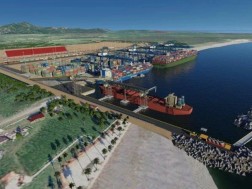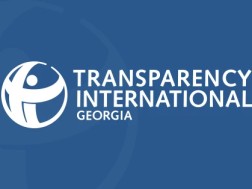Transparnacy International Georgia (TI Georgia) published a report, noting that TI Georgia has been observing the developments surrounding the Anaklia sea port since 2018. In 2020, the Government of Georgia terminated the contract with a consortium of Western companies that was supposed to build the Anaklia port. On May 29 this year, it became known that the Ministry of Economy and Sustainable Development selected a Chinese-Singaporean holding, which is known for corruption-related scandals and is under restrictions imposed by the U.S. Government, as the investor in the Anaklia port.
The Minister of Economy, Levan Davitashvili, has stated that the investment volume of the first phase of the project is USD 600 million. Fifty-one percent of the Anaklia port will remain under the ownership of the Government of Georgia, while a 49% stake will be owned by the Chinese-Singaporean holding.
The consortium selected for the port’s construction includes the Chinese state company, China Communications Construction Company Limited (CCCC), and China Harbour Investment Pte. Ltd, which is registered in Singapore, but is a subsidiary of the same Chinese state company. In addition, subcontractors of the consortium are China Road and Bridge Corporation and Qingdao Port International Co.
Since June 2021, the leading company of the Chinese consortium, China Communications Construction Company Limited (CCCC), has been under restrictions on the part of the U.S. It has been included in the consolidated sanctions list (Non-SDN List) of the Office of Foreign Asset Control (OFAC) of the U.S. Department of the Treasury due to its being a part of the Chinese military-industrial complex. Companies included in this list are not barred from access to assets and from carrying out financial transactions, but they are subject to certain restrictions. In accordance with the U.S. Export Administration Regulations, if American companies want to carry out transactions related to certain types of export, re-export and transfers of technologies with companies included in this list, they are to obtain a permission from the Government. This means that Georgia does not violate the regime of sanctions by cooperating with CCCC, although the Chinese company included in the Non-SDN List is prohibited from purchasing U.S.-produced components without the U.S. Government’s permission.
CCCC is one of the largest state-owned Chinese companies that is focused on the construction and operation of large infrastructure projects, including ports, airports, etc. CCCC and several of its subsidiaries were included in the U.S. OFAC List due to construction of artificial islands for the Chinese Army in the South China Sea. According to the U.S. assessment, the construction of the islands violated the norms of international law.
CCCC has been accused of facts of corruption on several occasions:
* In 2009, the World Bank prohibited CCCC from participating in its projects for eight years due to revelation of facts of corruption in a tender announced by the Government of the Philippines;
* In 2009, a subsidiary company of CCCC paid a bribe of USD 19 million to the son of the country’s President in Equatorial Guinea in return for his help in a tender;
* In 2014, a subsidiary of CCCC built a center for advanced technology education in Ecuador. Several years after construction, more than 80% of the campus facilities are unusable due to structural failures;
* In 2018, the Government of Bangladesh prohibited the operations of a subsidiary of CCCC, China Harbor Engineering Company, for offering bribes to Government officials;
* In 2018, the Government of Malaysia suspended a railroad project of CCCC. The reason here was also corruption.
A subsidiary of CCCC, China Road and Bridge Corporation, which is also involved in the Anaklia port project, has been operating in Georgia since 2018; specifically, it has been building the Ubisa-Shorapani section of the East-West highway. The construction works were financed by the European Investment Bank (EIB). Since November 2021, China Road and Bridge Corporation has been building the Tsnori bypass road, which is being implemented with the support of the Asian Development Bank (ADB).
On September 10, 2020, the U.S. Embassy to Georgia released information regarding CCCC, in which they point out that the activities of the Chinese company in developing countries are distinguished by shoddy construction, labor abuses, environmental damage and unsustainable debt. The Spokesperson for the U.S. Department of State made a similar statement on June 1 this year. He additionally noted that it is important to make sure that Georgia’s security and sovereignty, or the security of the country’s Euro-Atlantic partners, are not threatened.
Bringing a U.S.-sanctioned Chinese state company into the Anaklia port project in parallel with the adoption of the „Russian law“ is a continuation of the change of Georgia’s external orientation. The construction of the country’s international transport infrastructure has not only an economic significance; it has an important geopolitical dimension. It should also be taken into account that the selected Chinese company is distinguished by corruption-related scandals, which increases the risks of importing corruption to Georgia, the more so at a time when the Georgian authorities are engaged in repressions against non-governmental organizations. The non-governmental sector is an indispensable institution for controlling and preventing corruption risks in the country.























